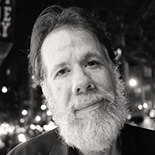 Martin Espada (born August 7, 1957) is a Latino poet, and professor at the University of Massachusetts Amherst, where he teaches poetry. Puerto Rico has frequently been featured as a theme in his poems.
Martin Espada (born August 7, 1957) is a Latino poet, and professor at the University of Massachusetts Amherst, where he teaches poetry. Puerto Rico has frequently been featured as a theme in his poems.
For the community of Newtown, Connecticut,
where twenty students and six educators lost their
lives to a gunman at Sandy Hook Elementary
School, December 14, 2012
Now the bells speak with their tongues of bronze.
Now the bells open their mouths of bronze to say:
Listen to the bells a world away. Listen to the bell in the ruins
of a city where children gathered copper shells like beach glass,
and the copper boiled in the foundry, and the bell born
in the foundry says: I was born of bullets, but now I sing
of a world where bullets melt into bells. Listen to the bell
in a city where cannons from the armies of the Great War
sank into molten metal bubbling like a vat of chocolate,
and the many mouths that once spoke the tongue of smoke
form the one mouth of a bell that says: I was born of cannons,
but now I sing of a world where cannons melt into bells.
Listen to the bells in a town with a flagpole on Main Street,
a rooster weathervane keeping watch atop the Meeting House,
the congregation gathering to sing in times of great silence.
Here the bells rock their heads of bronze as if to say:
Melt the bullets into bells, melt the bullets into bells.
Here the bells raise their heavy heads as if to say:
Melt the cannons into bells, melt the cannons into bells.
Here the bells sing of a world where weapons crumble deep
in the earth, and no one remembers where they were buried.
Now the bells pass the word at midnight in the ancient language
of bronze, from bell to bell, like ships smuggling news of liberation
from island to island, the song rippling through the clouds.
Now the bells chime like the muscle beating in every chest,
heal the cracks in the bell of every face listening to the bells.
The chimes heal the cracks in the bell of the moon.
The chimes heal the cracks in the bell of the world.
====
LETTER TO MY FATHER
Martin Espada
Love Song of the Bat with Vertigo
The bucket dumps me into the night air, a bat with vertigo, and I flap
away upside down, searching the darkness for the light glimmering
from your hair.
====
WHO BURNS FOR THE PERFECTION OF PAPER
Martin Espada